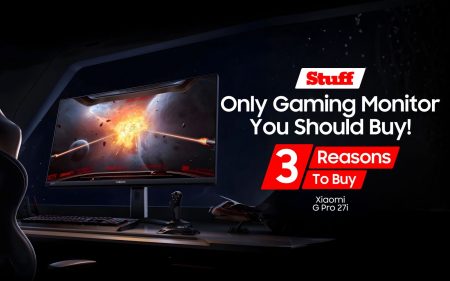Last week we took a look at the most budget friendly notebooks available in South Africa at the moment. Sadly, the pickings are a little slim at that price point and we had to sneak in a couple on special just to flesh out the list. This bracket, of notebooks between R5,000 and R10,000 has a little more going on.
And yet… we’re still not there yet. Stuff is often asked to provide laptop options but, unfortunately, here in SA portable computers only start becoming interesting around the R15,000 mark. That doesn’t mean the cupboard is bare — we’ve collected a few options for you to check out if your budget is ten grand or less. And we’ve also included one you shouldn’t touch with the proverbial really long pole.
HP Pavilion x360
 There are several versions of HP’s X360 machine out there but this is the entry level. It combines HP’s attention to detail and build quality with an affordable bunch of specs. At this price point the spec isn’t quite high enough to be sexy but it’s high enough. This notebook is a convertible, with the eager-to-please hinge that lets you use it in tablet mode (and a few others). There’s an Intel Pentium Gold 7075, which springs from the Tiger Lake lineup, 4GB of RAM and 256GB of storage. HP have included Bang and Olufsen audio, a solid set of ports and an eight-and-a-half hour battery. This X360 notebook will make someone a fine work machine. It might be you.
There are several versions of HP’s X360 machine out there but this is the entry level. It combines HP’s attention to detail and build quality with an affordable bunch of specs. At this price point the spec isn’t quite high enough to be sexy but it’s high enough. This notebook is a convertible, with the eager-to-please hinge that lets you use it in tablet mode (and a few others). There’s an Intel Pentium Gold 7075, which springs from the Tiger Lake lineup, 4GB of RAM and 256GB of storage. HP have included Bang and Olufsen audio, a solid set of ports and an eight-and-a-half hour battery. This X360 notebook will make someone a fine work machine. It might be you.
Buy it here | R10,000
Asus X543BA
 If you’re in the market for something a little beefier and are okay with a step-down on screen resolution, then the Asus X543BA might just be for you. Powered by AMD’s A9-9425 processor, part of the company’s Stoney Ridge range, this particular spec also includes 16GB of RAM and 512GB of SSD storage. That’s almost enough to make you forgive the sub-standard display. This notebook, unfortunately, maxes out at 1,366 x 768 onscreen. The integrated Radeon R5 GPU will give this little battler a few gaming chops but you won’t be running launch titles at anything like a decent frame rate any time soon. But it’ll do for a bit more grunt for an office machine. It really is a pity about the sub-HD display — Asus’ machine was doing so well up to this point.
If you’re in the market for something a little beefier and are okay with a step-down on screen resolution, then the Asus X543BA might just be for you. Powered by AMD’s A9-9425 processor, part of the company’s Stoney Ridge range, this particular spec also includes 16GB of RAM and 512GB of SSD storage. That’s almost enough to make you forgive the sub-standard display. This notebook, unfortunately, maxes out at 1,366 x 768 onscreen. The integrated Radeon R5 GPU will give this little battler a few gaming chops but you won’t be running launch titles at anything like a decent frame rate any time soon. But it’ll do for a bit more grunt for an office machine. It really is a pity about the sub-HD display — Asus’ machine was doing so well up to this point.
Buy it here | R9,000
Microsoft Surface Go2
 Technically, putting this machine here is cheating. It doesn’t come with the pictured keyboard cover as standard — that’ll cost you an extra R2,000, which pushes the Microsoft Surface Go 2 over our R10,000 mark. But since you get the slate itself for just R8,500, that’s how we’re justifying its presence here. Because it’s an excellent bit of hardware, even if you need to purchase the keyboard separately. The Intel Pentium Gold 4425Y chipset takes its pedigree from the company’s Kaby Lake range and there’s 4GB of RAM and 64GB of storage behind the 10.5in PixelSense touchscreen display. But the hardware is optimised for Microsoft’s operating system and the Surface Go reflects the company’s usual adherence to quality when it comes to build. This is the option to take if you’re after as portable a machine as possible but only need it for basic tasks where storage isn’t too much of a concern. It’s hard to explain the attraction of these machines, but if you hold one you’ll understand the draw.
Technically, putting this machine here is cheating. It doesn’t come with the pictured keyboard cover as standard — that’ll cost you an extra R2,000, which pushes the Microsoft Surface Go 2 over our R10,000 mark. But since you get the slate itself for just R8,500, that’s how we’re justifying its presence here. Because it’s an excellent bit of hardware, even if you need to purchase the keyboard separately. The Intel Pentium Gold 4425Y chipset takes its pedigree from the company’s Kaby Lake range and there’s 4GB of RAM and 64GB of storage behind the 10.5in PixelSense touchscreen display. But the hardware is optimised for Microsoft’s operating system and the Surface Go reflects the company’s usual adherence to quality when it comes to build. This is the option to take if you’re after as portable a machine as possible but only need it for basic tasks where storage isn’t too much of a concern. It’s hard to explain the attraction of these machines, but if you hold one you’ll understand the draw.
Buy it here | R8,500
HP 255 G7
 Another AMD-powered wonder, this HP 255 G7 features a decent crop of specs. But if you’re mostly concerned about RAM, you may want to opt for the Asus machine above. This one’s only toting 8GB of RAM, which is decent but it’s not 16GB (although, there is space to upgrade). There’s an AMD Ryzen 5 3500U, a slightly older chipset, inside as well as integrated Vega 8 graphics. This is perhaps the oldest spec machine here, with a 1,366 x 768 display doing most of the work. You can definitely do better, but perhaps you’re fond of the plucky underdog. Hey, it could happen.
Another AMD-powered wonder, this HP 255 G7 features a decent crop of specs. But if you’re mostly concerned about RAM, you may want to opt for the Asus machine above. This one’s only toting 8GB of RAM, which is decent but it’s not 16GB (although, there is space to upgrade). There’s an AMD Ryzen 5 3500U, a slightly older chipset, inside as well as integrated Vega 8 graphics. This is perhaps the oldest spec machine here, with a 1,366 x 768 display doing most of the work. You can definitely do better, but perhaps you’re fond of the plucky underdog. Hey, it could happen.
Buy it here | R9,000
Acer Aspire 3 15.6in
 Acer’s machines tend to all look a bit samey but this one is packing a little more under the hood than you’d expect. The only Core i3 notebook on this list, the Aspire 3 is packing an Ice Lake i3-1005G1 processor backed by 8GB of RAM and 512GB of SSD storage. Its 15.6in display is full HD (1,920 x 1,080), putting it right at the top in terms of versatility (in this price range). You’ll find a mostly-complete set of ports here — USB 2.0 and 3.0 are supported, but USB-C is nowhere to be found. You will find yourself with an ethernet port, in case you’re still rocking wires, and integrated WiFi in case you aren’t. As with all these machines, Acer’s entry is a bit of a workhorse but it doesn’t really cross into ‘attractive’ territory. We’ll get to that in a bit.
Acer’s machines tend to all look a bit samey but this one is packing a little more under the hood than you’d expect. The only Core i3 notebook on this list, the Aspire 3 is packing an Ice Lake i3-1005G1 processor backed by 8GB of RAM and 512GB of SSD storage. Its 15.6in display is full HD (1,920 x 1,080), putting it right at the top in terms of versatility (in this price range). You’ll find a mostly-complete set of ports here — USB 2.0 and 3.0 are supported, but USB-C is nowhere to be found. You will find yourself with an ethernet port, in case you’re still rocking wires, and integrated WiFi in case you aren’t. As with all these machines, Acer’s entry is a bit of a workhorse but it doesn’t really cross into ‘attractive’ territory. We’ll get to that in a bit.
Buy it here | R9,000
One to avoid
Mecer Guru 13.3in
We cannot, in good conscience, let anyone buy this particular notebook. It’s absolutely not worth the money being asked for it, and we’ll tell you why: because you can nab an almost identical spec machine for less than R5,000. The Celeron N3350 processor here is an ageing piece of silicon — it’s possible to overlook this if you’re on a massive budget but not at this price point. There’s a mere 64GB of storage, which can be expanded by up to 128GB, but only 4GB of RAM. This 13.3in machine ships with a 1,920 x 1,080 touchscreen display, which isn’t the selling point you might expect, thanks to the wholly mediocre spec of the rest of the machine. The price is about R4,000 too high to boot. You shouldn’t touch this one unless it’s on a humongous special.
[Don’t] buy it here | R8,850
Header image by Annie Spratt on Unsplash




